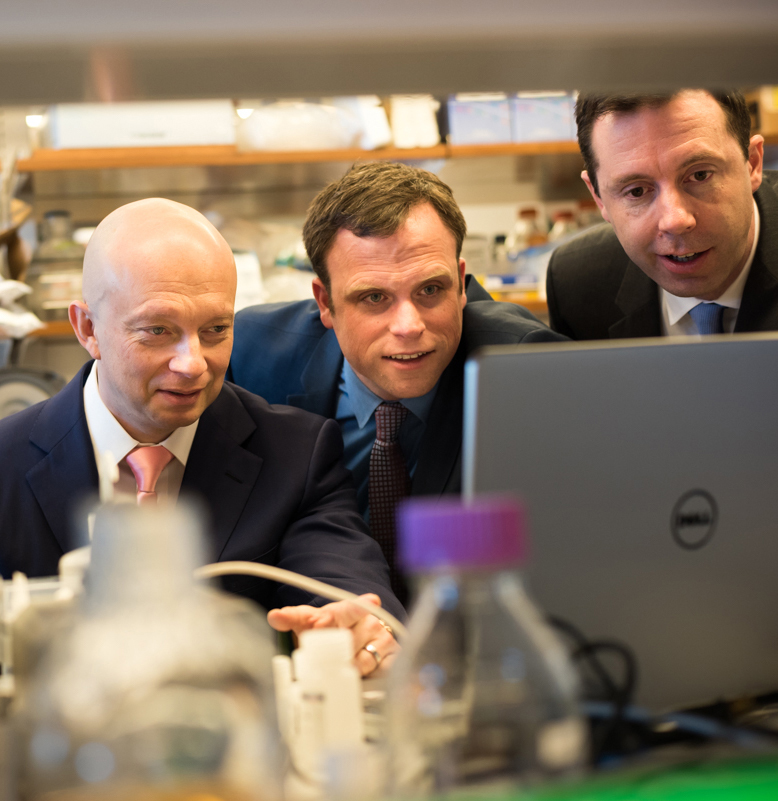Weill Cornell initiative combines financial, medical expertise
By Anne Machalinksi

Weill Cornell Medicine announced April 28 a gift made by WorldQuant LLC and Igor Tulchinsky that will further realize the promise of precision medicine. The $5 million gift establishes a new initiative that will use predictive tools to enhance Weill Cornell Medicine’s capability to diagnose and treat a variety of illnesses to improve outcomes for patients.
The WorldQuant Initiative for Quantitative Prediction brings together financial and medical experts whose collaboration strives to enhance biomedical research. Weill Cornell Medicine’s scientists, working closely with researchers and technologists from WorldQuant, will deploy predictive tools and quantitative methods to deepen the understanding of genetic factors that drive disease in individual patients. Using sophisticated algorithms, the new initiative will enable the research team to analyze genomic data to identify patterns and trends that may predict patients’ future risk of developing disease, as well as potential outcomes. These insights may be used to improve the diagnosis and treatment of illnesses including cancer, neurological disorders, cardiovascular diseases and infections.
Weill Cornell Medicine researchers Christopher Mason, the WorldQuant Research Scholar, and Olivier Elemento, the Walter B. Wriston Research Scholar, will lead the initiative, which will involve joint work with physician-scientists at the Caryl and Israel Englander Institute for Precision Medicine and the Sandra and Edward Meyer Cancer Center at Weill Cornell Medicine.
“This outstanding gift will accelerate and expand Weill Cornell Medicine’s approach to precision medicine, providing new predictive tools that will lead to even better outcomes for patients,” said Jessica Bibliowicz, chairman of the Weill Cornell Medicine Board of Overseers. “We are very grateful to Igor Tulchinsky and WorldQuant, LLC for making this initiative possible.”
“The use of quantitative prediction for patients represents an important new tool at Weill Cornell Medicine,” said Dr. Augustine M.K. Choi, the Stephen and Suzanne Weiss Dean at Weill Cornell Medicine. “We appreciate Mr. Tulchinsky’s generosity, which will help us achieve new goals in the rapidly evolving field of precision medicine.”
For WorldQuant, an international quantitative investment management firm founded by Tulchinsky, who is chairman and CEO, applying predictive algorithms to medical research is a natural progression. “There is a great opportunity to leverage the technology and proprietary algorithms we’ve developed for use outside of the financial markets, particularly around predictive medicine and cancer research, where the stakes are so high,” said Tulchinsky, a member of the Board of Overseers at Weill Cornell Medicine. “This initiative has tremendous possibilities, and I am proud to help drive advances in the field.”
Mason and Elemento will leverage new technologies to analyze clinical samples and visualize diseased tissues at single-cell resolution. These methods will be combined with a supercomputing infrastructure, which includes developing new software to crunch data using advanced pattern-recognition algorithms to model disease progression.
One of the initiative’s ultimate goals is to give researchers the ability to examine a blood draw or urine sample from one patient and predict his or her future risk for developing a specific type of cancer. The same technology could also give researchers the ability to rapidly diagnose patients and predict which treatments might work, which treatments may encounter resistance and how the disease is likely to progress. This framework may enable investigators to analyze single cells and molecules from blood, tumor biopsies, saliva or other clinical samples collected from patients seeking care at Weill Cornell Medicine and NewYork-Presbyterian/Weill Cornell Medical Center, then use analytical algorithms to create personalized predictive models based on findings from longitudinal healthcare data.
To accomplish this, Mason and Elemento will work closely with WorldQuant’s research team and intend to recruit software engineers and experts in artificial intelligence who can develop innovative quantitative prediction tools and analyze findings. They will continue to provide advanced training in quantitative biology and modeling to Weill Cornell Medicine’s physician-scientists to support this effort.
“We are looking forward to using the tools and methods that will result from this philanthropic investment to tease apart disease cells’ secrets and create predictive models of health for patients,” said Mason, an associate professor of physiology and biophysics, an associate professor of computational genomics at the HRH Prince Alwaleed Bin Talal Bin Abdulaziz Al-Saud Institute for Computational Biomedicine, and an associate professor of neuroscience in the Feil Family Brain and Mind Research Institute at Weill Cornell Medicine. “Not only does this gift enable new science and predictive models in medicine, it also creates an unprecedented collaboration between two big-data groups at Weill Cornell Medicine and WorldQuant.”
Said Elemento, associate director of the Institute for Computational Biomedicine and an associate professor of physiology and biophysics at Weill Cornell Medicine: “This incredibly generous gift will likely spur a whole new generation of biomedical discoveries by helping bring predictive disease analytics to precision medicine. We’re profoundly thankful to Igor for his support, and grateful to have WorldQuant as a partner in pioneering new approaches to understanding cancer, infections and neurological diseases.”
Anne Machalinski is a freelance writer for Weill Cornell Medicine.
Media Contact
Get Cornell news delivered right to your inbox.
Subscribe